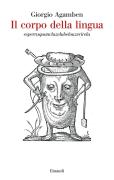Il corpo della lingua

esperruquancluzelubelouzerirelu
The giants - Morgante and Gargantua, Fracasso and Pantagruel - make their appearance in European literature between the end of the fifteenth century and the middle of the sixteenth century. But the immensity of their bodies goes hand in hand with another and no less imposing license: that of their language. Pantagruel's idiom is as immense as his body and equally exorbitant is the macaronic language of Folengo's poem. If Rabelais's neologistic fury seems to have no restraint (one of the words he invents consists of fifty-seven letters) and completely overturns the French lexicon, Folengo does much more: he invents not words, but a language, macaronic (so called from "a certain dumpling kneaded with flour, cheese and butter, large, rough and rustic"), which transgresses without reservations the firm Dantean distinction between the vulgar and Latin, latinizing the vulgar and vulgarizing Latin. For both, language is no longer, according to a stale though still dominant doctrine, the sign of a concept of the mind: it is first of all a body, which can be seen, felt, touched, a body like that of giants, with its own obscene physiology and an even more vulgar anatomy: a body fleeing no one knows where, but certainly outside of any grammatical identity and any defined lexicon.